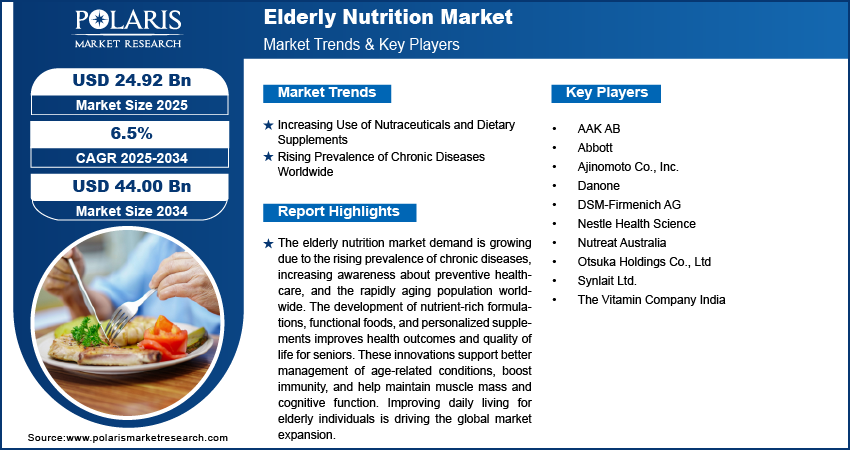Elderly Nutrition Market Driven by Rising Health Concerns and Nutritional Deficiencies in Seniors

The global elderly nutrition market is experiencing significant growth, driven by an aging population, increased health awareness, and advancements in nutritional science. This press release provides a country-wise analysis of the market, highlighting key trends and developments shaping the industry.
Market Overview
The elderly nutrition market encompasses products and services designed to meet the unique dietary needs of individuals aged 60 and above. These offerings include specialized foods, supplements, and fortified beverages aimed at promoting healthy aging, managing chronic conditions, and enhancing overall well-being. The market's expansion is fueled by several factors:
- Aging Population: The global increase in life expectancy has led to a larger elderly demographic, creating a higher demand for tailored nutritional solutions.
- Chronic Disease Management: Nutritional interventions play a crucial role in managing age-related conditions such as diabetes, cardiovascular diseases, and cognitive decline.
- Health Consciousness: Growing awareness about the impact of diet on health has prompted older adults to seek products that support longevity and vitality.
Country-Wise Market Analysis
- United States
The U.S. holds a significant share of the global elderly nutrition market. Factors contributing to this dominance include:
- High Healthcare Expenditure: Substantial investments in healthcare facilitate access to specialized nutritional products.
- Advanced Research and Development: Ongoing studies and innovations in nutrition science lead to the development of effective dietary solutions for the elderly.
- Regulatory Support: Government initiatives and policies promote the availability and accessibility of elderly nutrition products.
Germany is a leading market in Europe for elderly nutrition, driven by:
- Aging Population: A substantial proportion of the population is aged 65 and above, increasing the demand for age-specific nutritional products.
- Healthcare Infrastructure: Well-established healthcare systems ensure the availability of quality nutritional interventions.
- Consumer Awareness: High levels of health awareness among the elderly population encourage the adoption of specialized nutrition.
Japan's elderly nutrition market is characterized by:
- Super-Aging Society: Japan has one of the highest proportions of elderly citizens globally, necessitating tailored nutritional solutions.
- Technological Integration: The use of technology in developing and delivering nutritional products enhances accessibility and effectiveness.
- Cultural Emphasis on Health: Traditional dietary practices focusing on balance and nutrition align with modern elderly nutrition trends.
India is witnessing rapid growth in the elderly nutrition sector due to:
- Large Elderly Population: A significant and growing elderly demographic creates a vast market for specialized nutrition products.
- Urbanization: Increasing urbanization leads to lifestyle changes, prompting a need for convenient and fortified nutritional options.
- Government Initiatives: Policies aimed at improving healthcare access and nutrition for the elderly support market growth.
𝐄𝐱𝐩𝐥𝐨𝐫𝐞 𝐓𝐡𝐞 𝐂𝐨𝐦𝐩𝐥𝐞𝐭𝐞 𝐂𝐨𝐦𝐩𝐫𝐞𝐡𝐞𝐧𝐬𝐢𝐯𝐞 𝐑𝐞𝐩𝐨𝐫𝐭 𝐇𝐞𝐫𝐞 @ https://www.polarismarketresearch.com/industry-analysis/elderly-nutrition-market
- China
China's elderly nutrition market is expanding, influenced by:
- Demographic Shifts: A declining birth rate and increasing life expectancy contribute to a larger elderly population.
- Economic Growth: Rising disposable incomes enable greater expenditure on health and nutrition products.
- Cultural Acceptance: Traditional Chinese medicine and dietary practices are being integrated into modern nutritional solutions.
In Brazil, the elderly nutrition market is growing due to:
- Improved Healthcare Access: Enhanced healthcare services increase the availability of nutritional interventions for the elderly.
- Awareness Campaigns: Public health initiatives raise awareness about the importance of nutrition in aging.
- Product Innovation: Development of culturally appropriate and palatable nutritional products caters to the preferences of the elderly population.
The UK market for elderly nutrition is influenced by:
- National Health Service (NHS) Support: The NHS provides resources and guidelines for elderly nutrition, promoting public health.
- Research Initiatives: Ongoing research into aging and nutrition leads to the development of evidence-based dietary solutions.
- Community Programs: Local initiatives offer support and education on nutrition for older adults.
Australia's elderly nutrition market is characterized by:
- High Quality Standards: Strict regulations ensure the safety and efficacy of nutritional products for the elderly.
- Active Aging Culture: A focus on active aging encourages the adoption of nutrition products that support mobility and independence.
- Collaborative Efforts: Partnerships between government, healthcare providers, and the private sector promote elderly nutrition.
France's market for elderly nutrition is shaped by:
- Geriatric Expertise: A strong emphasis on geriatric care leads to specialized nutritional interventions.
- Dietary Guidelines: National dietary guidelines provide a framework for developing appropriate nutrition products.
- Public Awareness: Campaigns educate the elderly population on the importance of nutrition in aging.
South Korea's elderly nutrition market is influenced by:
- Technological Advancements: Innovations in food technology lead to the development of functional foods for the elderly.
- Government Support: Policies focus on improving the nutritional status of the aging population.
- Cultural Preferences: Traditional foods are being adapted to meet the nutritional needs of older adults.
Emerging Trends
Several trends are shaping the future of the elderly nutrition market:
- Personalized Nutrition: Tailoring nutritional solutions to individual needs based on genetic, lifestyle, and health factors.
- Functional Foods: Development of foods that provide health benefits beyond basic nutrition, such as probiotics and fortified beverages.
- Online Retail: Growth of e-commerce platforms offering convenient access to a wide range of elderly nutrition products.
- Sustainable Practices: Increasing demand for environmentally friendly and ethically sourced nutritional products.
Conclusion
The elderly nutrition market is poised for continued growth, driven by demographic shifts, technological advancements, and a heightened focus on health and wellness among older adults. Understanding country-specific dynamics and emerging trends is crucial for stakeholders aiming to capitalize on opportunities in this evolving market.
More Trending Latest Reports By Polaris Market Research:
Digital Video Advertising Market
Higher Education Technology Market
Generative AI Coding Assistants Market
Sodium Trimetaphosphate Market
Non-alcoholic Steatohepatitis Treatment Market
- Art
- Causes
- Crafts
- Dance
- Drinks
- Film
- Fitness
- Food
- Jogos
- Gardening
- Health
- Início
- Literature
- Music
- Networking
- Outro
- Party
- Religion
- Shopping
- Sports
- Theater
- Wellness
- Travels

